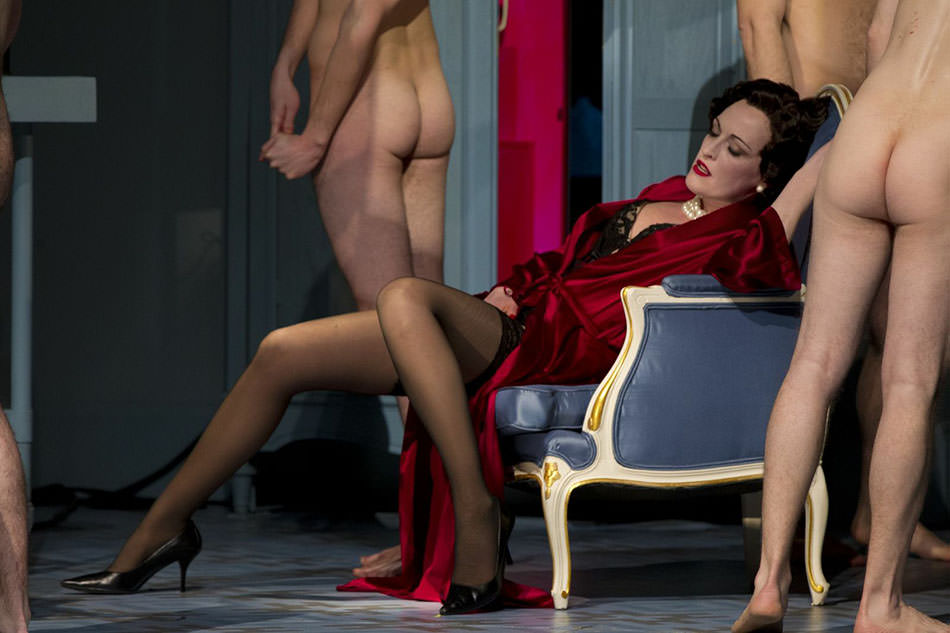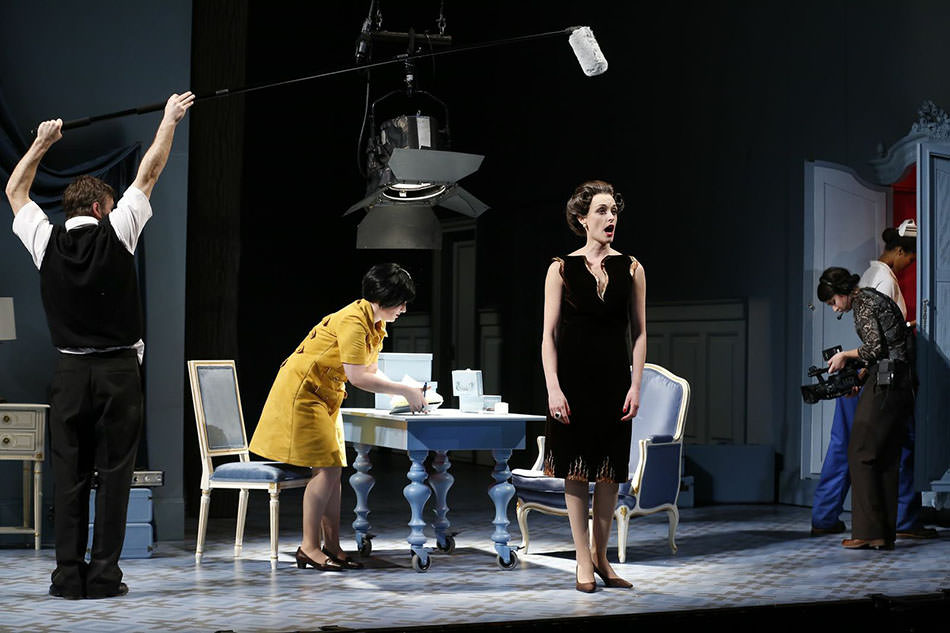“Even horrible people are tragic.” With this widely quoted phrase Thomas Adès summed up the gist of his 1995 opera Powder Her Face. The horrible person in question is Ethel Margaret Whigham, the fashionable debutante who became the Duchess of Argyll by her second marriage in 1951, and was divorced twelve years later following a trial that evidently handed the London tabloids almost more material than they knew what do with—a variety of sometimes well-documented affairs with some eighty-eight lovers of high and low degree—and more than the opera in its two-hour-and-twenty-minute running time can do much beyond hint at. Adès and his librettist Philip Hensher telescoped the Duchess’s affairs into a single call to room service, culminating notoriously in the first operatic aria sung by a character engaged in performing fellatio—a composition of muffled hums and cries, ending in an orgasmic crash, that is perfectly at home in the opera’s constantly disrupted sonic texture, where no style or tone or mood can persist for long without being shoved out of the way by another.
The horribleness of the Duchess is summed up by the judge in her divorce proceedings who (while, in the City Opera production, being sexually serviced himself by an unseen male) declares her “a woman unfit for marriage… a woman unfit to hold an ancient and honorable title.” As framed by Adès and Hensher the Duchess’s horribleness has more to do with her insatiable vanity and assumption of aristocratic privilege, her mental imprisonment in a bubble world in which “the only people who were ever good to me were paid for it”: a tragic fate that unfolds within a brutally farcical sex comedy, whose protagonist’s defects are more than matched by the exploitative, servile, caddish, voyeuristic, and hypocritically moralizing cast of characters surrounding her.
“Enough.” “Or too much.” These are the final words sung in the opera, just as the disgraced and now impoverished duchess is ejected, in her eighties, from her long-time residence in the Dorchester Hotel, for failing to pay rent. It sounds almost like a question Adès may have asked himself as he composed the work, at age twenty-four. One could see it as an attempt to test how many modes and textures—how many possible viewpoints and emotional readings, slapstick or embittered or pathetic—could be crammed into a work of such brevity, as if he might never have the chance again.
The set-up is ostensibly minimal: a hotel room and four singers. But in this jack-in-the-box chamber opera, the chamber mutates into a succession of other spaces, from a country house to a courtroom, and three of the four singers take on enough roles to fill out a much grander work. The extreme compression of musical forms and associations—Adès drags in tango and 1930s pop music and 1950s jukebox percussion along with inescapable echoes of Berg, Janacek, and Stravinsky—is matched by a radical compacting together of roles and decades. Serving as punctuation at every turn are those precise expressions of class distinction that constantly inflect each character’s response to the goings-on—from the Duchess’s “I like to have my usual maid” to the courtroom rubbernecker’s “From what I’ve heard they’ve their own code,” the words inflected by varying shades of haughtiness or deference, open envy or repressed mockery—and that make this so utterly English an opera even when it doesn’t sound like one.
What’s extraordinary about Adès’s score is how the disparate pieces of it mysteriously cohere. At one point, a 1930s lounge lizard (played by the tenor William Ferguson, who doubles as the electrician) launches into a perfectly tailored Jack Buchanan-style pop song—“There’s nothing in all the world / Like being curled around your little finger”— and the elements of drawing-room operetta come together magically for a stanza or so (Ferguson for a moment incarnating soft-shoe aplomb) before melting back seamlessly into their unstable surroundings.
Enough, or too much, might also be the question raised by Jay Scheib’s New York City Opera production of the work, which has just opened at BAM. Scheib has doubled down on the opera’s compression by adding a multitude of other elements. It is the busiest production imaginable, instilling something of a circus atmosphere, with an anonymous tumbler somersaulting over beds and a succession of broad sight gags, chairs pulled out from under, a collapsing stack of cardboard boxes, not to mention the twenty-five nude men who in the fourth scene emerge from beds, closets, bathrooms, and every other available point of ingress to represent at least a sampling of the duchess’s many lovers. There might be another way to do this opera, a darker, more anguished and decay-ridden way, but Scheib can hardly be faulted for the constant bright exuberance he has brought out, since the effect is to demonstrate what a dramatically resilient work this is. No doubt there are many more ways to do it as yet untried.
Advertisement
Scheib’s devices sometimes can clutter the precision of the work’s lines. That horde of nude men, for instance, comically emerging to fill most of the available space in the duchess’s bedchamber, lounging around to watch the TV, where a video of her husband having sex with a housemaid is showing, get in the way of our sense of the duchess’s fevered solitude and blur the effect of the room service scene that immediately follows. But absence of solitude becomes a running motif here, right up to the point in the last scene when the duchess (here played by Allison Cook) will finally find herself completely alone in the room from which she is about to be evicted. Not only does she have no place of her own; she does not even have herself: upstaged right from the start, she makes her first appearance not in person but as a derisory send-up in drag, as the electrician who has come to mend her tea tray dons her fur coat and does a campy and obscene take-off of the aging grande dame to the hysterical (and meticulously orchestrated) laughter of the hotel maid. By the time she makes her actual entrance, her reputation has preceded her.
This initial doubling is extended in Scheib’s staging by a proliferation of double images. Even before the curtain goes up we are watching a simultaneous video feed of what is happening in the hotel room, and throughout the early scenes, thanks to both hidden cameras and an on-stage camera operator stalking the characters, we are continually given a choice of watching the action on stage or the blown-up video images that occupy shifting portions of the visual field, images that either enlarge that action or display altogether different scenes taking place around the corner or in the adjacent hallway. We are caught up, as it were, in the same world of images by which the duchess and those around her are perpetually distracted. When the maid, laying out the food for a garden party, launches into her aria “Fancy being rich”—an oddly lovely and delicate passage, especially as sung by Nili Riemer, to shimmering Ravelian accompaniment—her evocations of “cut fruit in aspic… fish swimming in aspic” become the soundtrack for a grotesque commercial as the camera swoops down for immense close-ups of the luncheon goodies.
The opera gathers power as it goes along. The trial scene comes energetically into focus with a Monty Python-ish duet of onlookers from the general public followed by the judge’s cacophonous call for silence, which leads into his condemnatory speech—a piece of opera buffa grotesquerie. Things could not get much more comical; and at just that moment the duchess takes the stand and cuts through with a tone of austere defiance that has the effect, musically, of rolling over everything that has gone before: “So that is all. I am judged. I do not care. And that was all. There are worse things in life.”
Here, and throughout, Allison Cook is able to capture every jagged shift of the Duchess’s characterization. If Powder Her Face survives in the repertoire it will be above all because it creates an irresistible operatic role, a one-woman hall of mirrors whose force pulls together the whirl of fragments out of which the opera’s world is constructed. Even as the deluded and vampiric representative of a fading class, even in denial and decay—a decay which, it must be said, Cook’s vibrant presence could do little to suggest—she does finally stand in for a force that gives a glimmering half-life, even as she acknowledges that “there’s nothing in all the world,” to what would otherwise be a hollow puppet show. Her final duet with the hotel manager who comes to throw her out—a basso role, forcefully sung by Matt Boehler, summoning up some deathly figure, Charon or Hades, from a baroque opera—sweeps away the detritus of tea parties and scandal sheets at the edge of a room about to emptied.
The New York City Opera production of Thomas Adès’s Powder Her Face is playing at the Brooklyn Academy of Music through February 23




